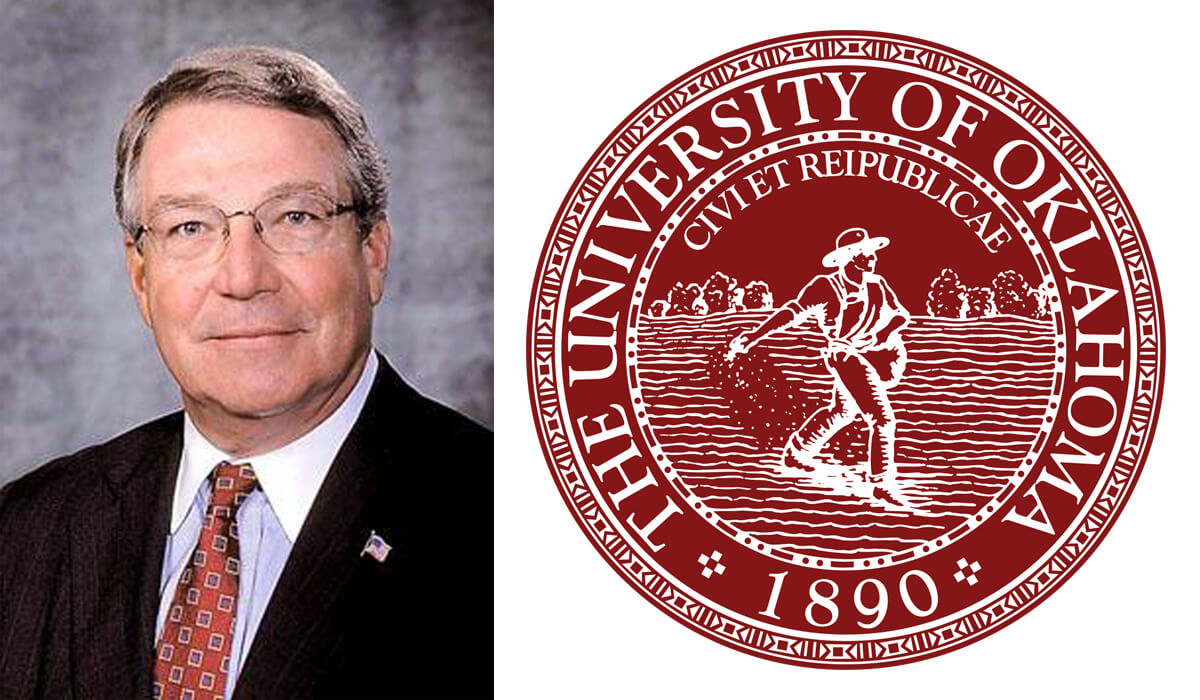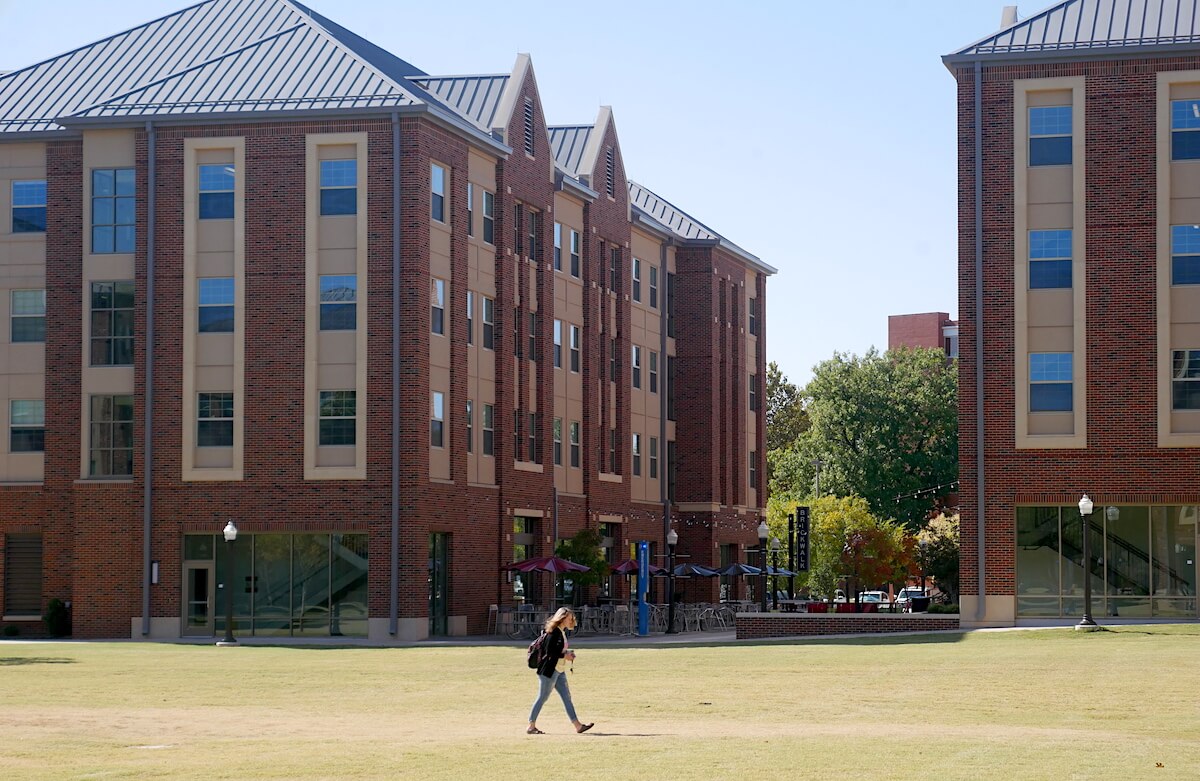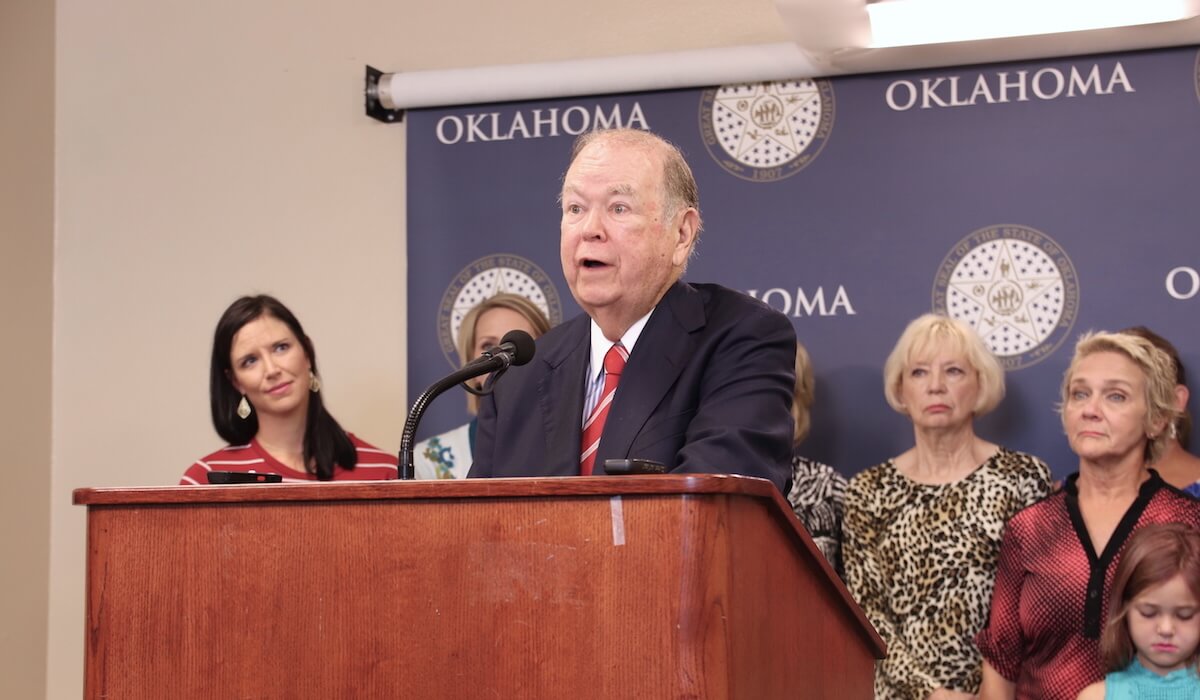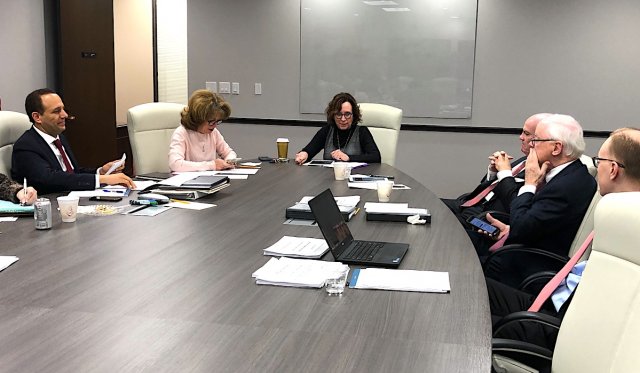

The University of Oklahoma Board of Regents spent more than eight hours in executive session today, discussing personnel matters, real estate situations and 10 lawsuits facing the university. Only four of the seven OU regents attended the day’s extensive private meeting, and none of the three regents appointed by Gov. Kevin Stitt this past year were present.
“That’s certainly (…) an interesting observation,” Chairwoman Leslie Rainbolt-Forbes said after the meeting adjourned around 5:30 p.m. “They’ll be fully briefed on what we’ve done and what we’ve discussed today, so that’s the plan to eliminate that as a difficulty. It’s been productive today, and I look forward to their being on the same page we are once they are briefed when they are available.”
The newest OU regent, Michael Cawley, missed what would have been his first board meeting. Chairman-elect Gary Pierson and regent Eric Stevenson were also absent. Both of those men reside out of state, in Colorado and Ohio, respectively.
The three men’s absence did not sit well with Rep. Mark McBride (R-Moore), chairman of the House Appropriations and Budget Education Subcommittee.
“Just being in one short executive session that I sat in a few months ago, knowing what’s going on at OU with Cross Village and other lawsuits, I don’t understand why three of the regents didn’t show up today,” McBride said by phone. “I was upset that I couldn’t make it today as a legislator and sit through those.”
RELATED
Stitt makes third appointment to OU Board of Regents by Tres Savage
While state law allows certain legislators the option to sit in and observe a board’s executive sessions, McBride said board members have the ultimate oversight responsibility for the public entity they serve. In this instance, that would be the University of Oklahoma, which is facing a $750 million lawsuit involving some of the largest bondholders in the United States.
Attorneys from the Quinn Emanuel law firm, which has been retained by the university to address the Cross Village housing development lawsuit, spent several hours with OU regents and administrators during Wednesday’s executive session, which began shortly after 9 a.m.
Those attorneys left around 2:30 p.m. McAfee & Taft attorney Drew Neville, who is assisting OU with a series of lawsuits filed by current and former employees, left just after 4 p.m.
“This is where the rubber meets the road. These are the kind of things you don’t miss when you’ve got an eight-hour executive session,” McBride said of the three absent regents. “I sat through a one-hour executive session, and I can’t imagine missing an eight-hour executive session when OU has so much to deal with.”
Nichols: ‘Maybe we shouldn’t appoint so many people from out of state’
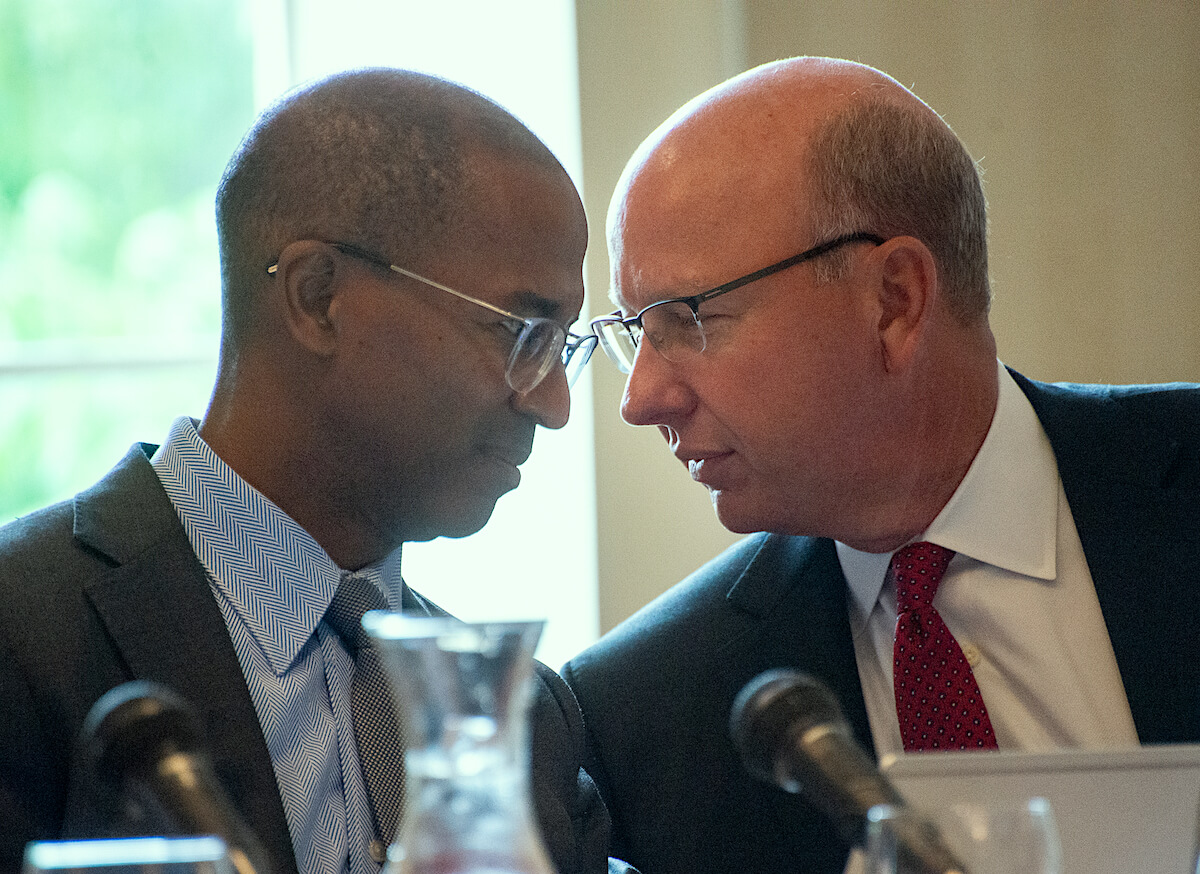
Rep. Monroe Nichols (D-Tulsa) said his reaction to all three of Stitt’s recent appointments not attending Wednesday’s meeting ranged from “unfortunate” to “unbelievable.”
“The University of Oklahoma has some very significant challenges that it is facing, and to be missing folks at the table as those challenges are being discussed underscores a reason why maybe we shouldn’t appoint so many people from out of state,” Nichols said.
Nichols holds a masters in public administration from OU and is a member of the Legislative Black Caucus, which has called for more diversity on the OU Board of Regents and critiqued Stitt’s appointment of Stevenson because he lives in Ohio.
“There are about 300,000 African Americans in the state of Oklahoma, not one of whom apparently was qualified to be on the OU Board of Regents?” Nichols asked. “That blows me away given the significant issues around race at the University of Oklahoma.”
Nichols said three regents missing Wednesday’s executive session is “a big problem,” but he said Stevenson’s absence in particular meant no regent of color was in the room to deal with the day’s issues.
“That is a significant perspective to be left out of what is happening right now, which makes it incredibly frustrating,” Nichols said. “It’s pretty frustrating to see these things happen, which are the same things we warned against back when [Stitt] was making appointments.”
Asked the governor’s reaction to his three appointees’ absence, communications director Bailey Lakey said Stitt was seeking an explanation.
“We have reached out to get an understanding as to what happened with attendance at this one board meeting,” Lakey said.
Interim OU President Joe Harroz said the knowledge and intellect of regents like Pierson, Stevenson and Cawley helps them stay up to speed even if they must miss a meeting.
“Obviously it would be ideal to always have all seven,” Harroz said. “I think if their only interaction about the institution was just at these meetings that would create concern for a particular meeting, but I’m telling you they really are fabulous.”
Harroz said the current OU Board of Regents “is a really good board.”
“Mike Cawley knew before he got appointed that he had a conflict. Each of those who weren’t here today are in really regular contact and are really engaged,” Harroz said.
Still, Harroz admitted that the three absent regents meant fewer voices in the room asking questions and discussing options on serious topics.
“So seven is ideal, but on the legal issues that are discussed, you look at the individuals who weren’t here today, they are serious people who know these issues, have dived into them and are in regular communication about them,” Harroz said.
OU regents in spotlight over past year
Wednesday’s lengthy executive session marked the first OU Board of Regents meeting of 2020. The four regents in attendance Wednesday were: Chairwoman Leslie Rainbolt-Forbes, former Gov. Frank Keating, Phil Albert and Natalie Shirley. A series of committee meetings is scheduled to start at 9 a.m. Thursday, with the full board meeting in open session at 11:30 a.m. (An agenda for that meeting can be found here.)
Chris Purcell, secretary for the OU Board of Regents, said the three members absent Wednesday would also miss Thursday’s meetings.
RELATED
‘Quite a mess’: OU’s Cross Village risks ramifications by Tres Savage
OU regents faced a marathon 2019, spending several hours in an April executive session to hear a report from the Jones Day law firm about alleged sexual and financial misconduct by former President David Boren, who retired in 2018 after 24 years as OU president. In May 2019, OU regents again spent several hours in executive session after Boren’s successor, Jim Gallogly, had resigned as president on Mother’s Day. After a meeting that lasted until 2 a.m., regents selected Harroz, Boren’s longtime legal counsel, as interim president for a term of 15 months.
Boren and former OU Vice President of University Development Tripp Hall remain under criminal investigation by the state’s top law enforcement agency for alleged sexual misconduct. Concern about allegations of misconduct by Boren has left state lawmakers questioning whether the OU Board of Regents provided adequate oversight during the past 25 years.
In October 2019, the organization Freedom of Information Oklahoma announced the OU Board of Regents as recipient of its annual Black Hole Award, given to public bodies viewed to have “thwarted the free flow of information.”
RELATED
David Boren, Tripp Hall remain under OSBI investigation by Tres Savage
At an unusual October lunch meeting attended by only one member of the public, the board selected Pierson as its next chairman instead of then-regent Renzi Stone. Shortly after the meeting, Stone announced his resignation from the board. In December, Stitt filled Stone’s vacant seat by appointing Cawley, a businessman from Ardmore.
Sara Bana, a victims rights advocate who has worked on behalf of men who have accused Boren and Hall of sexual misconduct, briefly attended Wednesday’s meeting and sat in the library’s lounge outside the closed conference room. The only other members of the public present were two journalists.
Bana said the absence of three OU regents for an eight-hour executive session is a growing problem with the board.
“The lack of consistent representation and participation of appointed OU Board of Regents members at scheduled meetings conveys that they do not take their responsibilities seriously,” Bana said. “It is evidence of their lack of commitment to their duties and to the larger OU community. If current regents do not see these meetings as priority while the university continues to struggle with ongoing crises, maybe they should reconsider this level of public service.”
Nichols said he has hope that OU as an institution “will be fine” in the long run, but he and other state legislators want answers about what has happened at the university. Nichols referenced a series of racist acts, reports of financial problems and numerous allegations of sexual misconduct on campus.
“The level to which these systems broke down at the university is unconscionable, and I hope whatever comes next is not just stronger controls internally but definitely a higher degree of transparency with how the business is being run at the university and ensuring that the university is a very welcoming environment for students, no matter where they come from,” Nichols said. “I think this underscores the issue of regents not being there.”









